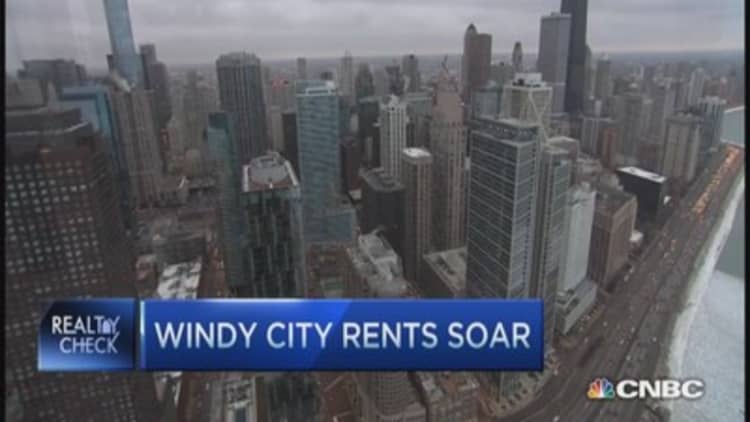This week Illinois Gov. Bruce Rauner told the Chicago City Council that it could expect no help from him with its money problems.
"For Chicago to get what it wants, Illinois must get what it needs,'' , pointing out that the state government faces its own deficit.
As Chicago's fiscal crisis becomes more pressing, chatter about the city being "the next Detroit" has gotten louder. Chicago has unfunded pension liabilities that will only get worse over the coming years and a public school system that has a $1 billion deficit for the fiscal year 2016.
In late February, Chicago was downgraded by Moody's to Baa2 with a negative outlook. The agency warned that if current laws stand, Chicago's annual pension contributions will increase by 135 percent in 2016.
Read MoreIllinois and Chicago are $130B underfunded: Advisor
In a report this month, Moody's said that the city's risk of insolvency will grow if statutes do not change how the city funds its pension plans.
But drawing parallels with Detroit—which in 2013 filed the largest municipal bankruptcy in U.S. history—is premature, experts told CNBC. Both cities face or faced financial dilemmas, but the causes and scale of their problems differ hugely.
"Detroit offers such a strong example of default and bankruptcy that Chicago ends up being impugned by comparison," said Matt Fabian, a partner at Municipal Market Analytics.
Chicago is facing some considerable fiscal pressures, but it does have the tools available to address them.Matthew Butleranalyst, Moody's
The broader economic and demographic positions of the two cities are vastly different. Chicago is the third-largest city in the country, with a vibrant economy and large, taxable population. Detroit had been suffering from a population exodus for decades, along with a crippled economy after much of the auto industry moved out.
"A property tax increase could solve Chicago's problems tomorrow," Fabian said. "But the city has chosen not to do that, even though it has the potential." Chicago could raise taxes by 50 percent and still have lower taxes than New Jersey, he said.
Read MoreHousing supply dogs a recovering Detroit
That option, he said, was not available in Detroit, which is why the city eventually filed for Chapter 9. "It is very hard to see Illinois ever approving Chapter 9," Fabian said. "Chicago is the heart of the state, and it is in no one's interest to fall into bankruptcy."
Detroit, on the other hand, was a drag on the state of Michigan and bore the brunt of much antipathy, said Fabian.
Even if there is some kicking of the can going on in terms of paying off pensions, an insolvent Chicago will most likely not happen, he said. One possible solution would be a combination of higher property taxes over the next five to 10 years and some sort of political agreement for a slower schedule to pay off pension debts. It could even include the city's having to sell its O'Hare or Midway airports in order to raise capital.

Chicago's stronger economy and credit profile mean it has the economic leverage to address its fiscal issues, a benefit that Detroit did not share, said Matthew Butler, an analyst at Moody's.
"Chicago is facing some considerable fiscal pressures, but it does have the tools available to address them," he said.
Those tools potentially include reduced budget costs, or the unpopular move of raising taxes. "Relative to the current levy, a tax hike would be high, but keep in mind Chicago's tax levy is quite low," said Fabian.
Read MoreAmerica's best cities for small businesses
Fabian said the city can afford to raise taxes since it has the lowest rate in Cook County. Therefore, a hike wouldn't create a wide tax imbalance with surrounding suburbs, he added.
Former New York Lt. Gov. Richard Ravitch has spent years warning of America's impending pension crisis but he, too, sees big differences between Chicago and its regional neighbor in Michigan.
"There is no analogy between the two, except they are making the political decision to borrow money rather than raise taxes and make spending cuts," he told CNBC.
Ravitch acknowledged that a more austere approach is unpopular with most people, but added that "raising taxes is better than letting the system fall apart."
—Reuters contributed to this report.



